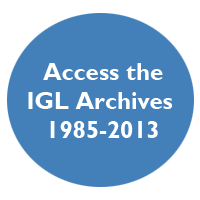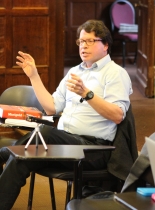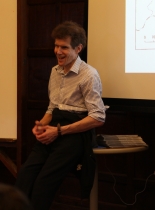Syllabus
EPIIC 2014-15
RUSSIA: In the XXI Century
Syllabus
Tuesday, September 2
Orientation and Explanation of EPIIC
Thursday, September 4
Guest Lecturer: Alexandra Vacroux
Alexandra Vacroux (EPIIC’86) is the Executive Director of Davis Center for Russian and Eurasian Studies at Harvard University. Prior to joining the Davis Center, Vacroux held a variety of scholarly and business positions. Her research and non-profit experience includes tenures as Scholar at the Kennan Institute (Woodrow Wilson International Center for Scholars), Interim Eurasia Program Officer for the Social Science Research Council, and Research Associate at the Center for Financial and Economic Research (CEFIR) in Moscow. In the commercial and government spheres, she previously served as Director for Sales and President of the U.S. Brokerage for Brunswick Warburg investment bank in Moscow and as a consultant to the Russian Privatization Agency.
Book
Russia: A 1,000-year Chronicle of the Wild East by Martin Sixsmith (begin)
Tuesday, September 9
Guest Lecturer: Carol Saivetz
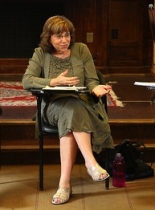
Carol R. Saivetz is a research associate at Harvard’s Davis Center for Russian and Eurasian Studies and a research affiliate at the Security Studies Program at MIT. Saivetz has consulted for the US Government on topics ranging from energy politics in the Caspian Sea region to Russian policy toward Iran. From 1995-2005, she was the Executive Director of the American Association for the Advancement of Slavic Studies. She is the author of In Search of Pluralism: Soviet and post-Soviet Politics.
Handouts (available at 96 Packard Ave)
-"Will Cheap Gas Save Ukraine?", Maragrita Balmaceda, Problems of Post-Communism, Vol. 61, No. 2 (March/April, 2014), pp. 61-67
-"Why the Ukraine Crisis is the West's Fault," John Mearsheimer, Foreign Affairs, Vo. 93, No. 5, (September 2014)
-"A Broken Promise?", Mary Elise Sarotte, Foreign Affairs, Vol. 93, No. 5 (September, 2014)
-"NATO After Crimea," Michael O'Hanlon, Foreign Affairs, April 17, 2014
-"Ukrainian Long Division," Alina Polyakova, Foreign Affairs, April 20, 2014 Excerpt from
-"The Black Sea: A History", Charles King, pp 1-21, 261-347
Listen to the Audio Recording of this Lecture
Thursday, September 11
Guest Lecturer: Serhii Plokhii
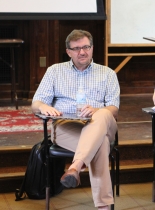
Serhii Plokhii is the Mykhailo S. Hrushevs'kyi Professor of Ukrainian History in the Department of History at Harvard University and the Director of Harvard’s Ukrainian Research Institute. He is the author of many books related to Russia, including The Cossack Myth: History and Nationhood in the Age of Empires, Yalta: The Price of Peace, The Origins of the Slavic Nations: Premodern Identities in Russia, Ukraine and Belarus, and Unmaking Imperial Russia: Mykhailo Hrushevsky and the Writing of Ukrainian History.
Book
The Last Empire: The Final Days of the Soviet Union by Serhii Plokhii
Listen to the Audio Recording of this Lecture Here
Tuesday, September 16
Guest Lecturer: James Hershberg (G'89)
After teaching at Tufts and the California Institute of Technology in 1989-91, he directed the Cold War International History Project (and edited the project's Bulletin) from 1991-96 before coming to George Washington University in 1997 as a professor of history and editor of the CWIHP book series co-published by the Stanford University and Wilson Center Presses. He received the 1994 Stuart Bernath Prize from the Society for Historians of American Foreign Policy. Currently working on various case studies of U.S. communications with Cold War adversaries (Cuba, China, North Vietnam, Iran), he is a co-founder of The GW Cold War Group, a Cold War studies group at GWU for both faculty and students, and works closely with the National Security Archive, a declassified documents repository and research institute based at the University.
Media
Please look through the Cold War International History Project site. Watch CNN's Cold War Series, available in the Tufts library or to buy and watch online: http://www.amazon.com/Vietnam-1954-1968/dp/B00848VOGE/ref=sr_1_2?s=movies-tv&ie=UTF8&qid=undefined&sr=1-2&keywords=cnn+cold+war
Handout
-“The Cuban Missile Crisis” by James G Hershberg (2009)
Listen to the Audio Recording of this Lecture Here
Thursday, September 18
Guest Lecturer: Mark Kramer
Mark Kramer is Director of the Cold War Studies Program at Harvard University and a Senior Fellow of Harvard's Davis Center for Russian and Eurasian Studies. He has taught at Harvard, Yale, and Brown Universities and was formerly an Academy Scholar in Harvard's Academy of International and Area Studies and a Rhodes Scholar at Oxford University. Professor Kramer is the author of Crisis in Czechoslovakia, 1968: The Prague Spring and the Soviet Invasion; Soldier and State in Poland: Civil-Military Relations and Institutional Change After Communism; and three forthcoming books, Crisis in the Communist World, 1956: De-Stalinization, the Soviet Union, and Upheavals in Poland and Hungary; The Collapse of the Soviet Union; and Income Distribution and Social Transfer Policies in the Post-Communist Transition: Changing Patterns of Inequality (to be published in 2009). He is completing another book titled From Dominance to Hegemony to Collapse: Soviet Policy in East-Central Europe, 1945-1991, which, like his earlier books on the Soviet bloc, draws heavily on new archival sources from the former Communist world.
Handouts
-“The Russian-Chechen Conflict and the Putin-Kadyrov Connection” by Mark Kramer
-“The North and the South in the Caucasus – Separated or Interlinked?” by Uwe Halbach
-“Guerrilla Warfare, Counterinsurgency, and Terrorism in the North Caucasus: The Military Dimension of the Russian-Chechen Conflict” by Mark Kramer
-“The North Caucasus: The Challenges of Integration (II), Islam, the Insurgency and Counter-Insurgency” by the International Crisis Group, October 2012
-“Understanding Suicide Terrorist Bombings in Russia” by Mark Kramer, PONARS, May 2011
-“Ethnic Competition, Radical Islam, and Challenges to Stability in the Republic of Dagestan” by Edward C Holland and John O’Loughlin, 2010
Listen to the Audio Recording of this Lecture Here
Friday, September 19-Sunday, September 21
Immersion Weekend
Guest Lecturer: Joshua Rubenstein
Joshua Rubenstein was on the staff of Amnesty International USA from 1975 to 2012 as New England Coordinator and Northeast Regional Director. He was also Scholar-in-Residence at Facing History and Ourselves in 2012 and 2013. He is a long-time Associate of the Davis Center for Russian and Eurasian Studies at Harvard University. Working as an independent scholar, Rubenstein is the author of Soviet Dissidents, Their Struggle for Human Rights and Leon Trotsky: A Revolutionary’s Life. Mr. Rubenstein is the co-editor of Stalin’s Secret Pogrom: The Postwar Inquisition of the Jewish Anti-Fascist Committee and of The KGB File of Andrei Sakharov.
Handouts
-“Sakhalin Island” by Anton Chekhov, Chapter 21 from A Journey to Sakhalin
-“To the Democracy” by Maxim Gorky, from Untimely Thoughts
-“Holodomor: The Great Famine in Ukraine 1932-1933” from The Institute of National Remembrance Excerpt from The Yogi and the Commissar by Arthur Koestler
-“The Politics of Famine: American Government and Press Response to the Ukrainian Famine, 1932-1933” by James E. Mace, from Holocaust and Genocide Studies Vol. 3, No. 1 pp 75-94
-“Russians Hungry, But Not Starving” by Walter Duranty, special cable to the New York Times, 1933
-“The Record of a Trial” by Malcolm Cowley, New Republic, 1937 Chapter 26, from People, Years, Life by Ilya Ehrenburg
-“Removing Nations” by Norman M. Naimark, Chapter 5 from Stalin’s Genocides
-“The Night of the Murdered Poets” by Joshua Rubenstein, The New Republic, 1997
-“The Case of the Arrested Kremlin Doctors,” The Current Digest of the Soviet Press, 1953
-“The Legacy of Stalin” by I.F. Stone, from The Best of I.F. Stone “Appendix I” by Robert Conquest, from The Pasternak Affair
-“Russian Writers Protest” by Victor Zorza, The Guardian, 1964
-“The Case Against Brodsky” from Time Magazine, 1964
-“A Poet in Prison” by Andrew Field, 1964
-“Brodsky: Reactions in Moscow” by George Feiffer, 1964
-“2 Soviet Authors are Convicted” by Peter Grose, New York Times, 1966
-“Soviet Justice on Trial,” New York Times, 1966
-“Excerpts from Soviet Reports on Trial of Writers,” New York Times, 1966
-“Russians Can Dissent But—“ by Peter Grose, New York Times, 1966
-“Sinyavsky-Daniel Case: Works of Convicted Russians Viewed as Having Challenged ‘Socialist Realism’” by Marc Slonim, New York Times, 1966
-Excerpts from In Quest of Justice: Protest & Dissent in the Soviet Union Today by Abraham Brumberg Excerpts from My Testimony by Anatoly Marchenko
-“The Enduring Voice of the Soviet Dissidents” by Joshua Rubenstein, Columbia Journalism Review, 1978
-“An Appeal to The UN Committee for Human Rights” by A. Yakobson, et al, 1969
-“Soviet Expert Asks Intellectual Liberty” by Raymond H. Anderson, New York Times, 1968
-Excerpt from “The KGB File of Andrei Sakharov” by Joshua Rubenstein and Alexander Gribanov
-As Breathing and Consciousness Return” by Alexander Solzhenitsyn, from Under the Rubble
-“Between Earth and Hell” by George Kennan, The New York Review of Books, 1974
-“Soviet Formally Accused Solzhenitsyn of Treason” by Hedrick Smith, New York Times, 1974
-“Solzhenitsyn Exiled to West Germany and Stripped of his Soviet Citizenship” by Hedrick Smith, New York Times, 1974
-“‘Gulag’ Defended by Yevtushenko” by Hedrick Smith, New York Times, 1974
-“Excerpts from Roy Medvedev’s Essay on Solzhenitsyn’s ‘Gulag Archipelago’,” The New York Times, 1974
-“Native Son,” The New York Times, 1974
-“Dead Souls,” The New York Times, 1974
-“Sakharov Backs Non-Marxist View” by Hedrick Smith, The New York Times, 1974
-“How I Came to Dissent” by Andrei Sakharov, The New York Review of Books, 1974
-“Jerry, Don’t Go,” The Wall Street Journal “Brezhnev, at Parley, Sees Bar to Dictating Others” by Christopher S. Wren, The New York Times, 1975
-“Brezhnev at Helsinki,” The New York Times, 1975
-“The Give and Take of Détente” by Robert Keatley, The Wall Street Journal, 1975
-“In Defense of Helsinki” by Leonard D. Sussman, The Wall Street Journal, 1985
-“A Sick Society” by Andrei Sakharov, New York Times, 1980
-“Sakharov Says He Wants Trial, Not ‘Gilded Cage’” by Craig R. Whitney, New York Times, 1980
-“Moscow Complains Sakharov ‘Blabbed’ About Vital Secrets” by Craig R. Whitney, New York Times, 1980
-“Andrei Sakharov Can’t be Banished,” New York Times, 1980
-“Andrei Sakharov, 68, Nuclear Inventor and Mainspring of the Soviet Conscience” by Raymond Anderson, New York Times, 1989
-“Marchenko is Dead in a Soviet Prison” by Serge Schmemann, New York Times, 1986
-“He Gave Moscow No Peace” by Joshua Rubenstein, New York Times, 1986
-“Andrei Sakharov Goes Home,” New York Times, 1986
-“Gorbachev Plays a ‘Liberator’ Game,” New York Times, 1987
-“Soviet Turns a Big Corner: Release of Dissidents More Than a Gesture” by Philip Taubman, New York Times, 1987
-“How Many Held in Soviet? Figures Vary” by Bill Keller, New York Times, 1987
-“Sakharov’s List: Immediately after gaining his freedom, the prominent dissident made a plea for the release of 14 other men—and put to the test Gorbachev’s liberalization policies” by Bill Keller, New York Times, 1987
-“Sakharov’s Pro-Gorbachev Stand: Attacked, He Stands His Ground” by Bill Keller, New York Times, 1987
-“On Gorbachev” by Elena Bonner, New York Review of Books, 1990
-“Death in Chechnya” by Sergei Kovalev, New York Review of Books, 1995
-“A Letter of Resignation” by Sergei Kovalev, New York Review of Books, 1996
-“A Tale of Love and Fascism” by Anna Politkovskaya, from A Dirty War
-“Why Putin Wins” by Sergei Kovalev, New York Review of Books, 2007
-“Putin vs. the Truth” by Orlando Figes, New York Review of Books, 2009
-“Pussy Riot Tells All” by Joe Nocera, The New York Times, 2014
Tuesday, September 23
The United Nations Security Council
Guest Lecturer: Mauricio Artiñano (Tufts '06, EPIIC 03-04)
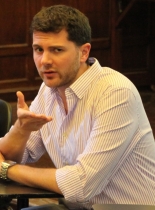
Mauricio Artiñano graduated summa cum laude from Tufts University with a BA in International Relations in 2006. While at Tufts, Mauricio participated in the 2003-04 EPIIC Colloquium "Dilemmas of Empire and Nation-Building: The U.S. Role in the World," which he fondly recalls as one of the most powerful academic and personal experiences of his life. After Tufts, Mauricio worked for the Project on Justice in Times of Transition on several peace building projects in Central America and Colombia. He was then appointed Minister Counsellor for the Permanent Mission of Costa Rica to the United Nations during Costa Rica's 2008-09 term as elected member of the UN Security Council. He first served as thematic expert on African issues and peacekeeping and later as Security Council Political Coordinator. Mauricio recently graduated from Princeton University's Woodrow Wilson School of Public and International Affairs with a Masters in Public Affairs, where he co-wrote a report for the UN Secretary-General's Policy Planning Unit on the effects of terrorism on UN field missions. During the summer of his Masters, he interned for the United Nations Mission in South Sudan (UNMISS). In a few weeks he will be deployed to Mogadishu to serve as Planning Officer for the UN Assistance Mission in Somalia (UNSOM).
Readings (Handouts, Attachments, and Websites)
General Information About the UN Security Council
-Please peruse the Security Council’s website (http://www.un.org/en/sc) to quickly go over the basics of the Council (composition, role, etc.). Please read the chapter “The Council in Context” from David Bosco’s book Five to Rule Them All: The UN Security Council and the Making of the Modern World.
Current Issues on the Security Council’s Agenda
-The Security Council Report is a non-profit organization that provides excellent in-depth, day-to-day coverage of the activities of the Security Council. I recommend that you peruse their September 2014 Monthly Forecast of the issues that are expected to be addressed by the Council during this month under the U.S. Presidency of the Council.
Articles on Russia and the Security Council
-Foreign Policy’s Colum Lynch is one of the Council’s most astute observers. Please read the articles below in chronological order:
“Rice, Churkin trade blows in Security Council.” March 12, 2013. “New Syria Deal Proves Yet Again: The UN Is Russia's Home Court.” Sept 26, 2013 “Olympic Gain: With Sochi Winding Down, Russia Signs Off On U.N. Syria Resolution.” February 22, 2014. “Beijing and Moscow Part Ways Over Ukraine.” March 5, 2014 “Russia Opposed Humanitarian Aid Corridors in Syria Before It Favored Them in Eastern Ukraine.” June 2, 2014.
Russia’s Statements in the Security Council
I think it will be interesting for you to read some of Russia’s official statements before the Council. Some that I have attached as particularly relevant are the following:
In July 2008, the United Kingdom and other members of the Council introduced a draft resolution imposing sanctions on members of the Mugabe regime in Zimbabwe. The resolution was vetoed by China and Russia (with South Africa, Libya and Viet Nam also voting against, and Indonesia abstaining). Please read Ambassador Churkin’s explanation of Russia’s vote (SC/PV.5933, 11 July 2008) Ambassador Churkin’s statement on Sunday, August 10, 2008 during the war in Georgia. Please also read the tense exchange between Ambassador Churkin and Ambassador Khalilzad of the United States towards the end of the meeting. (SC/PV.5953, 10 August 2008) Ambassador Churkin’s statement before the Council declaring Russia’s recognition of the independence of South Ossetia and Abkhazia. Please read the statement he makes later on in the meeting following the speech by the President of the Council. (SC/PV.5969, 28 August 2008) Incidentally, you can see that there was a tense exchange between Amb. Churkin and Ambassador Urbina of Costa Rica ;-) Russia’s explanation of vote following the adoption of Resolution 1973 (2011) which authorized the use of force in Libya. Russia abstained, as did China, Germany, India and Brazil. (SC/PV.6498, 17 March 2011) Ambassador Churkin’s statement at a Council meeting on the situation in Libya on March 7, 2012. Note the accusations he makes against NATO and the responses of NATO members and of the Libyan Prime Minister, who was present at the meeting. (SC/PV.6731, 7 March 2012) Ambassador Churkin’s statement at a Council meeting on the situation in the Ukraine on March 13, 2014. Note that Prime Minister Yatsenyuk of Ukraine was present at this meeting. (SC/PV.7134, 13 March 2014) Russia’s explanation of vote on May 22, 2014 after Russia and China vetoed a draft resolution referring the situation in Syria to the International Criminal Court. (SC/PV.7180, 22 May 2014) Notice how Ambassador Churkin talks about P5 units
Listen to the Audio Recording of this Lecture Here
Thursday, September 25
No Class – Rosh Hashanah
Tuesday, September 30
First Exam
(The exam can take up to 4 hours; everyone should plan to take it on their laptop, if this is a problem, please come and see us)
Thursday, October 2
Wikistrat Strategy
Guest Lecturers: Capt. Wayne Porter (ret, USN) and Ted Obenchain
Wayne Porter’s work in strategic planning on the personal staff of both the Chief of Naval Operations and the Chairman of the Joint Chiefs of Staff has received international recognition. His multiple overseas tours of duty included serving as the Assistant Chief of Staff (Intelligence) for US and combined naval forces in the Persian Gulf. He is the co-author of “A National Strategic Narrative,” published by the Woodrow Wilson Center for International Scholars and has written widely in publications that include the Harvard Business Review, the Hotspring Journal Quarterly, Naval Institute Proceedings, and many others. His work has been cited internationally by such luminaries as former UK Minister of Foreign Affairs, the Honorable David Milliband, former Israeli Foreign Minister, the Honorable Shlomo Ben Ami, and current US Secretary of Education, the Honorable Arne Duncan. Wayne is a Walton Fellow at Arizona State University’s Global Institute of Sustainability and holds two Masters of Science Degrees from the Naval Postgraduate School. He will soon be receiving his PhD in Information Sciences and System Dynamics from that institution where he has served as Chair, Systemic Strategy and Complexity. Wayne’s interests and strenghts’ lie in applying systems analysis to corporate and governmental strategic planning.
Ted Obenchain is the director of business development at Wikistrat Inc. He is responsible for orchestrating the firm’s business origination efforts across the public and private sectors. Prior to joining Wikistrat, Ted was the director of the government services business at Eurasia Group Ltd., a global geopolitical risk consultancy. He has also worked in senior business development and analytical roles at Science Applications International Corporation, a Fortune 500 international defense company, and The Cohen Group, a strategic advisory firm founded by former US Defense Secretary William Cohen. Ted holds a Master’s degree in International Affairs & International Economics from The Johns Hopkins University School of Advanced International Studies.
Oslo Freedom Forum: Russia and Human Rights
Guest Lecturer: Alex Gladstein (A’08)
Alex is the director of institutional affairs at the New York-based Human Rights Foundation, focusing on media and development. He has concurrently served as vice president of strategy for the Oslo Freedom Forum since its inception in 2009, and is coordinating HRF's Disrupt North Korea initiative. Alex's writing and views on dissidents and dictators have appeared in TIME, The Atlantic, BBC World, ABC, Foreign Policy, NBC, The Guardian, and The Wall Street Journal. Before joining HRF, he served in the office of a shadow foreign secretary in the British Parliament. Alex is a magna cum laude graduate of Tufts University where he majored in international relations and Middle Eastern studies.
Websites
WikiStrat: http://www.wikistrat.com/
Oslo Freedom Forum: https://oslofreedomforum.com/
Tuesday, October 7
Guest Lecturer: David Kalis
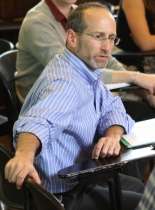
David A Kalis grew up in the Boston suburbs. He earned his B.A. in Soviet East European Studies from Tufts University and an M.B.A. from The University of Chicago, Graduate School of Business. Following his graduation from Tufts University, he spent two and a half years abroad in Russia which formed the basis for his memoir and ensuing career choices. Having worked at Kraft Foods, Procter & Gamble, and many small firms, David has experience focusing in areas of marketing, promotion, budgeting, and sales. In 2006, after many years of talking about the idea of writing his story, he finally began the work. Vodka Shot, Pickle Chaser is the culmination of combing through his experiences, organizing his thoughts, and presenting his journey and the life lessons he learned along the way.
Book
Vodka Shot, Pickle Chaser: A True Story of Risk, Corruption, and Self-Discovery Amid the Collapse of the Soviet Union, David Kalis
Listen to the Audio Recording of this lecture.
Thursday, October 9
Ukraine
Guests: WorldBoston Ukrainian Delegation
Mr. Andriy Oleksandrovych Chubatenko, Director, “Astarta” LLC Mr. Volodymyr Vasylovych Khmelyuk, Advisor to the Mayor, Kam’yanets-Podilsk Local Council;Former Director, Economics and Infrastructure Development Department, Apparatus of the Supreme Council of Ukraine Ms. Maryna Valentunivna Olhovska, Assistant to MP Katerynchuk M.D., Supreme Council of Ukraine; Former Head of Legal Department, “Absolute service” legal company LLC; FormerInspector, Central-Ukrainian Transport Prosecution Office Ms. Tetyana Mykolayivna Ovcharenko, Assistant to MP, Administrative office, Supreme Council of Ukraine; Former Journalist, Executive Editor, “Lviv portal” internet-publishing house Mr. Oleh Serhiyovich Zvyagin, Deputy Director, “Pryrodniy shedevr” (Nature Masterpiece) LLC; Member of Party, "Solidarity" Political Party
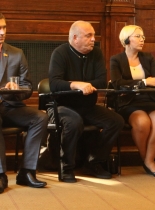
Handouts
-“Waiting for War: Can the Country Hold Together?” Keith Gessen, New Yorker, May 12, 2014
-“Ukrainian Gloom”, Rajan Menon and Alexander Motyl, Wilson Quarterly, Nov-Dec 2011
-“Why the Ukrainian Crisis Is the West’s Fault,” John J Mearsheimer, Foreign Affairs, September/October 2014
-“Putin’s Deadly Doctrine,” Timothy Garton Ash, New York Times, July 18, 2014
-“Long-term Cooperation between Russia and the West Shouldn’t Be Wasted because of Ukraine,” Russia Times, March 17, 2014 Remembering Yalta: The Politics of International History, Serhii Plokhy, The Harriman Review, 2009 (1)
Listen to the Audio Recording of this Lecture
Tuesday, October 14
Russia and US Security
Guest Lecturer: BRG GEN Kevin Ryan (US Army, ret)
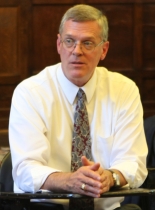
Brigadier General Kevin Ryan (U.S. Army retired) is Director, Defense and Intelligence Projects at Harvard Kennedy School’s Belfer Center for Science and International Affairs.
A career military officer, he served in air and missile defense, intelligence, and political-military policy areas. From 1995 to 1996, he was head of the Moscow office of the POW/MIA Commission, searching for missing Americans in the former Soviet states. From 1998 to 2000, he served as Senior Regional Director for Slavic States in the Office of Secretary of Defense and, from 2001 to 2003, as Defense Attaché to Russia. He also served as Chief of Staff for the Army's Space and Missile Defense Command, an organization with diverse missions that include deployment of missile defenses, cyber assets, satellite management and research in areas like directed energy. He has commanded at every level from platoon to brigade and served in Europe, Korea, and Iraq. In his last duty assignment he was responsible for Army Strategic War Plans, Policy, and International Affairs and coordinated Army policy in the domestic interagency and with foreign allies.
Ryan holds a Bachelor of Science degree from the U.S. Military Academy, a Masters degree in Russian Language and Literature from Syracuse University and, a Masters degree in National Security Strategy from the National War College. Ryan has been a fellow at Harvard Kennedy School's Shorenstein Center on Press, Politics and Public Policy and was Vice President for Business Development at iRobot Corporation. He is a member of the Board of the American Councils for International Education (ACTR/ACCELS) and a member of the Belfer Center Board of Directors. He is a member of the Kennedy School’s MPA Admissions Committee. Ryan was the founding director of the center's U.S.-Russia Initiative to Prevent Nuclear Terrorism, where he continues to facilitate U.S.-Russian cooperation and lead the “Elbe Group.” He was previously Executive Director for Research of the Belfer Center from 2010 to 2013. He is the author of over 20 articles and book chapters on various leadership and security topics.
Handouts
-“A Broken Promise? What the West Really Told Moscow about NATO Expansion” by Mary Elisse Sarotte, Foreign Affairs, September/October 2014
-“10 Reasons Why Russia Still Matters” by Grahman Allison ans Robert Blackwell, Politico, October 30, 2011
-“Elbe Group Seeks To Keep US-Russian Communications Open” by Kevin Ryan, Belfer Center, March 21, 2014
-“Putin’s Dilemma after Crimea” by Kevin Ryan, Moscow Times, April 17, 2014
-“The Future of Russia: Modernization in Decline?” by Adam Balcer and Nikolay Petrov, Carnegie Moscow Center, 2012 Russian Military Transformation-Goal in Sight?" by Keir Giles and Andrew Monaghan, Letort Papers, 5 May 2014.
-"Russian Saber-Rattling Has Eastern Europe Craving NATO Protection" by Doyle McManus, Los Angeles Times, 6 June 2014
-"Russia 'to alter military strategy towards NATO'" from BBC News, BBC News Europe, September 2, 2014 Ukrainians Name the Russian Army Colonel Leading Separatist Militias" by Irena Chalupa. Atlantic Council, April 28, 2014
Recommended
-"The Odessa Network: Mapping Facilitators of Russian and Ukrainian Arms Transfers" by Tom Wallace and Farley Mesko, c4ads, September 2013
Listen to the Audio Recording of this Lecture
Thursday, October 16
Guest Lecturer: Simon Saradzhyan
Simon Saradzhyan is assistant director of the U.S.-Russia Initiative to Prevent Nuclear Terrorism and a research fellow at Harvard Kennedy School’s Belfer Center. His research interests include international arms control, counter-terrorism, foreign, defense, and security policies of Russia and other post-Soviet states and their relations with great powers. Prior to joining the Belfer Center, Saradzhyan worked as a researcher for East West Institute and as a consultant for the United Nations and World Bank. Simon has also worked as deputy editor of the Moscow Times and as Moscow correspondent for Defense News. He has contributed scores of articles to other publications, ranging from the Times of London to Space News, earning certificate of merit from the commander of the Russian Strategic Missile Forces for his coverage of Russia's military affairs.
As an editor, he led coverage of such dramatic events in Russia, as the Dubrovka and Beslan-hostage taking crises. As a reporter, Simon has covered a number of milestone security events in Russia on the ground, including the October 1993 coup and the 1999 apartment bombings in Moscow. Saradzhyan is the author of a number of papers on arms control and security, including "Russia's Non-strategic Nuclear Weapons in Their Current Configuration and Posture: A Strategic Asset or Liability?" and "Russia's Support for Zero: Tactical Move or Long-term Commitment?" and published by the Belfer Center;"Russia: Grasping Reality of Nuclear Terror," published in the Annals of the American Academy of Political and Social Science; "Russia's System to Combat Terrorism and Its Application in Chechnya" published in the "National Counter-Terrorism Strategies" of NATO Security through Science Series; and "La Guerra Olvidada de Chechenia" (Forgotten War in Chechnya,) published in La Vanguardia Dossier Quarterly. Saradzhyan has presented his research at numerous conferences, such as the European Union Institute for Security Studies' annual conference and the EastWest Institute's annual Worldwide Security Conference. In his capacity as an expert, Saradzhyan has appeared on BBC, CBS, NPR, AP and Reuters television as well as on Russian radio and television stations.
Readings
-"Putin Again: Implications for Russia and the West" by Philip Hanson, James Nixey, Lilia Shevtsova and Andrew Wood, Chatham House, February 2012
Listen to the Audio Recording of this Lecture
Tuesday, October 21
Russia and Censorship
Guest Lecturer: Joshua Rubenstein, IGL INSPIRE Fellow
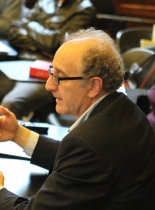
Joshua Rubenstein was on the staff of Amnesty International USA from 1975 to 2012 as New England Coordinator and Northeast Regional Director. He was also Scholar-in-Residence at Facing History and Ourselves in 2012 and 2013. He is a long-time Associate of the Davis Center for Russian and Eurasian Studies at Harvard University. Working as an independent scholar, Rubenstein is the author of Soviet Dissidents, Their Struggle for Human Rights and Leon Trotsky: A Revolutionary’s Life. Mr. Rubenstein is the co-editor of Stalin’s Secret Pogrom: The Postwar Inquisition of the Jewish Anti-Fascist Committee and of The KGB File of Andrei Sakharov.
Handouts (excerpts from the below)
-Case of Pyotr Chaadaev and the fate of his Philosophical Letters Institution of censorship by the Bolsheviks in 1917
-Pressure on writers like Ilya Ehrenburg, Yevgeny Zamyatin, and Boris Pilnyak not to publish their work separately in the West (late 1920s)
-Attacks on Soviet composers like Dmitri Shostakovich and Sergei Prokofiev in late 1940s Following Stalin’s death in 1953, initial attempts to challenge official controls over literature
-Case of Boris Pasternak and publication of Doctor Zhivago in 1957
-Case of Joseph Brodsky in early 1960s
-Arrest of Andrei Sinyavsky and Yuli Daniel in 1965 and emergence of Soviet human rights movement
-Career of Alexander Solzhenitsyn, The Gulag Archipelago, and his expulsion from the country in 1974 Reforms by Mikhail Gorbachev between 1986 and 1989; the relaxation of censorship
-Renewed repression and official (and semi-official) controls under Vladimir Putin
Listen to the Audio Recording of this Lecture
Thursday, October 23
The Russian Economy
Guest Lecturer: Alexandra Vacroux
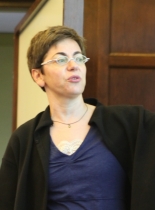
Alexandra Vacroux (EPIIC’86) is the Executive Director of Davis Center for Russian and Eurasian Studies at Harvard University. Prior to joining the Davis Center, Vacroux held a variety of scholarly and business positions. Her research and non-profit experience includes tenures as Scholar at the Kennan Institute (Woodrow Wilson International Center for Scholars), Interim Eurasia Program Officer for the Social Science Research Council, and Research Associate at the Center for Financial and Economic Research (CEFIR) in Moscow. In the commercial and government spheres, she previously served as Director for Sales and President of the U.S. Brokerage for Brunswick Warburg investment bank in Moscow and as a consultant to the Russian Privatization Agency.
Readings
-"Russia and the Global Financial-Economic Crisis" by Julian Cooper from Russia's Encounter with Globalization: Actors, Processes and Critical Moments, 2011
-Russia: A Long View by Yegor Gaidar, 2012, pp. 146-376
Listen to the Audio Recording of this Lecture
Tuesday, October 28
Post-Soviet Foreign Policy
Guest Lecturer: Robert Legvold
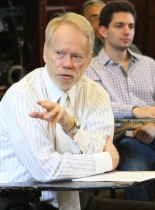
Robert Legvold is Marshall D. Shulman Professor Emeritus in the Department of Political Science at Columbia University, where he specialized in the international relations of the post-Soviet states. He was Director of The Harriman Institute, Columbia University, from 1986 to 1992. Prior to coming to Columbia in 1984, he served for six years as Senior Fellow and Director of the Soviet Studies Project at the Council on Foreign Relations in New York. For most of the preceding decade, he was on the faculty of the Department of Political Science at Tufts University. He received his Ph.D. from the Fletcher School of Law and Diplomacy in 1967. 2008-2010 he was project director for“Rethinking U.S. Policy toward Russia” at the American Academy of Arts and Sciences. From 2009-2012 he was director of the “Euro-Atlantic Security Initiative” sponsored by the Carnegie Endowment for International Peace and co-chaired by Sam Nunn, Wolfgang Ischinger, and Igor Ivanov. Dr. Legvold's areas of particular interest are the foreign policies of Russia, Ukraine, and the other new states of the former Soviet Union, U.S. relations with the post-Soviet states, and the impact of the post-Soviet region on the international politics of Asia and Europe. His most recent books are collaborative volumes, The Policy World Meets Academia: Designing U.S. Policy toward Russia(The American Academy of Arts and Sciences, 2010) and Russian Foreign Policy in the Twenty-first Century and the Shadow of the Past (Columbia University Press, 2007). Other recent books are, with Bruno Coppieters, Statehood and Security: Georgia after the Rose Revolution (The MIT Press, 2005), with Celeste Wallander, Swords and Sustenance: The Economics of National Security in Belarus and Ukraine (The MIT Press, 2004); Thinking Strategically: The Major Powers, Kazakhstan and the Central Asian Nexus (The MIT Press, 2002), with Sherman Garnett, Belarus at the Crossroads (The Carnegie Endowment, 1999), and with Alexei Arbatov and Karl Kaiser, Russian Security and the Euro-Atlantic Region (M.E. Sharpe, 1999). With Timothy Colton, he co-edited After the Soviet Union: From Empire to Nations, Norton, 1992.
Listen to the Audio Recording of this Lecture
Thursday, October 30
Class Discussion: Russian Orthodox Church led by TA Atanas Grozdev (Fletcher'15)
Symposium Theme Brainstorming Readings
-"Wake Up, Europe" by George Soros
-"Ukraine's Orthodox Breakup" by Andrew Walsh
Tuesday, November 4
Russia and the Internet
Guest Speaker: Emily Parker
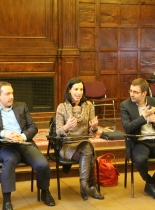
Emily Parker is the author of "Now I Know Who My Comrades Are: Voices From the Internet Underground" which was published by Sarah Crichton Books/Farrar, Straus & Giroux in February, 2014. Mario Vargas Llosa, winner of the 2010 Nobel Prize for Literature, wrote that the book is "a rigorously researched and reported account that reads like a thriller. It's been a while since I have read a book that is so entertaining, not to mention so encouraging for the culture of liberty." Vargas Llosa's full article about "Now I Know Who My Comrades Are" can be found here. Emily is currently digital diplomacy advisor and senior fellow at the New America Foundation, where she has been writing her book and leading a US-China innovation project called Green Electronics: A US-China Maker Challenge. Previously, Emily was a member of Secretary Clinton’s Policy Planning staff at the U.S. Department of State, where she covered 21st-century statecraft, innovation, and technology. While at State she advised on issues related to Internet freedom and open government, and traveled to the Middle East to explore the role of new media in post-revolutionary Egypt. She no longer has any affiliation with the U.S. government. Emily is a founder of Code4Country, the first open government coding marathon between the United States and Russia. Code4Country brought together Russian and American software developers to identify technological solutions to challenges of government transparency. Emily is a former International Affairs Fellow at the Council on Foreign Relations, an Arthur Ross Fellow at Asia Society's Center on U.S.-China Relations and a Global Policy Fellow at Carnegie Moscow Center, where she researched the role of blogging and social media in today's Russia. Emily spent over five years working for The Wall Street Journal, first as a writer in Hong Kong and later as an editor in New York. From 2004 to 2005, she wrote a Wall Street Journal column called "Virtual Possibilities: China and the Internet." She was also a staff op-ed editor for The New York Times. -"Russia" from Now I Know Who My Comrades Are: Voices from the Internet Underground by Emily Parker
Listen to the Audio Recording of this Lecture
Thursday, November 6
Mid-term Exam
Tuesday, November 11
No Class -- Veterans Day
Thursday, November 13
Ukraine's Challenges
Guest Lecturer: Oxana Shevel
Professor Shevel's research and teaching focus on the post-Communist region surrounding Russia and issues such as nation- and state-building, the politics of citizenship and migration, memory politics, and the influence of international institutions on democratization. She is the author of Migration, Refugee Policy, and State Building in Postcommunist Europe (Cambridge 2011), which examines how the politics of national identity and strategies of the UNHCR shape refugee admission policies in the post-Communist region, leading countries to be more or less receptive to refugees. The book received the 2012 American Association of Ukrainian Studies (AAUS) book prize. At present, Professor Shevel is working on a new book project - comparative study of the sources of citizenship policies in new post-Communist states.
Readings (please read in order):
-"Ukraine and Europe: Past and Future” by Tymothy Snyder, Eurozine, 16 April 2014,
http://www.eurozine.com/
Useful primer on Ukrainian-Russian-European history from the Kyivan Rus days till the current conflict.
-"Ukraine–Divided or Diverse" by Uilleam Blacker, Ukraineanalysis, 22 February 2014
http://ukraineanalysis.
Is Ukraine fatally divided into pro-Russian east and pro-western west? Blacker responds to those who say yes (in particular to Cohen and Darden and Way, whose articles are hyperlinked at the bottom of Blacker's piece and worth reading together with Blacker's response)
-"2014 Parliamentary Elections in Ukraine: Results, Reasons, and Implications" by Oxana Shevel, Paper presented at the 10th Annual Danyliw Research Seminar on Contemporary Ukraine
University of Ottawa, 30 October-1 November, 2014 (longer version of my 29 October 2014 op-ed in the Washington Post "How Putin Turned Ukraine to the West.")
http://www.danyliwseminar.com/
Elections just took place in Ukraine and produced historically-unprecedented results. The paper looks at the main outcomes, their causes, and possible future implications.
-“Why the Ukraine Crisis Is the West’s Fault” by John Mearsheimer, Foreign Affairs, (September/October 2014) and Michael McFaul and Stephen Sestanovich, “Faulty Powers: Who Started the Ukraine Crisis,” Foreign Affairs(November/December 2014).
These articles offer alternative explanations of Russia’s actions vis-à-vis Ukraine and causes of the current crisis. The original article puts blame on the west, the second one is a response that sees causes in Russian domestic developments.
-"Russia at the turn of the millenium" by Vladimir Putin, 30 December 1999
http://pages.uoregon.edu/
Putin's vision for the future of Russia at the time he first came into office
-“Full Text and Analysis of Putin’s Crimea Speech” by Bob Dreyfuss, The Nation, 19 March 2014
http://www.thenation.com/blog/
Putin spells out the rational for annexing Crimea as he sees it. Text of the speech with critical commentary.
-President Putin’s speech at the Meeting of the Valdai International Discussion Club, 24 October 2014, http://eng.news.kremlin.ru/
In the most recent public statement of his views, Putin defends his policies and accused Washington of provoking armed conflicts and undermining global security.
Recommended:
-"The Standoff in Kiev" by Andrey Slivka, The New Yorker, 11 February 2014
http://www.newyorker.com/news/
Useful background on how Yanukovych rule led Ukrainians to rise up against him and how government response to the protests escalated rather than diffused tensions
-"Why Putin Is Allied With Western Europe's Far Right" by Mitchell A. Orenstein, Foreign Affairs, 25 March 2014
http://www.foreignaffairs.com/
-"What Vladimir Putin Chooses Not to Know About Russian History" by Patricia Herlihy, Los Angeles Times, 1 May 2014
http://www.latimes.com/
-"Confronting Putin’s Russia" by Michael McFaul, New York Times, 23 March 2014
http://www.nytimes.com/2014/
Former US Ambassador to Russia and political science professor assesses new state of affairs in Russia-US relations
-“Wake up, Europe” by George Soros, The New York Review of Books, 20 November 2014
http://www.nybooks.com/
International financier offers policy recommendations for ameliorating the current crisis and identifies weaknesses of Europe when responding to Putin.
-"From the ‘Russian Spring’ to the Armed Insurrection: Russia, Ukraine and Political Communities in the Donbas" by Alexander Melnyk, Paper presented at the 10th annual Danyliw Research seminar (University of Ottawa), 29 October-1 November 2014. (Paper summary at http://www.danyliwseminar.com/
Detailed analysis of the causes of secessionist conflict in Donbas region in eastern Ukraine, with the focus on the question to what extent the conflict in Donbas - and earlier the rebellion in Crimea - is home-grown and to what extent it is instigated by Russia.
-The Monkey Cage posts on the events in Russia and Ukraine
http://www.washingtonpost.com/
Since the start of the Euromaidan protets, a number of scholars have contributed insightful pieces on various aspects of the current crisis and developments in Russia and Ukraine.
-"Crisis in Ukraine," a Foreign Affairs e-book 25 March 2014
http://www.foreignaffairs.com/
Different angles on the "Euromaidan" protests in Ukraine.
Listen to the audio recording of this lecture
Tuesday, November 18
Stalin to Putin: The Neuroscience of Dictatorship
Guest Lecturer: Justine Hardy
As a writer and journalist, Justine has reported on, and written about, South Asia for twenty-five years. Simultaneously she set up, and continues to run an organisation in Kashmir, North India, rehabilitating those suffering from the psychological fallout of conflict. In short, Justine works as both writer and mental trauma specialist. Having completed her training in conflict trauma therapy, Justine founded Healing Kashmir in 2008, an integrated mental health project addressing the debilitating mental health situation in the region. This project is now expanding rapidly, with a main base in Kashmir's summer capital, Srinagar, outreach centres around the state, a suicide helpline, a primary mental health care programme, also across the state, and an internship programme. During her training in this field Justine worked with New Bridge in the UK for twenty-two years, a foundation focusing on the rehabilitation of life sentence prisoners before release. She is an IGL INSPIRE Fellow.
Readings
- “The Mind of a Dictator: Exploring the Minds of Psychopaths and Dictators” by James Fallon
http://www.psychologytoday.com/blog/the-psychopath-inside/201111/the-mind-dictator
- “Vladimir Putin: Narcissist?” by Joseph Burgo
http://www.theatlantic.com/health/archive/2014/04/vladimir-putin-narcissist/360544/
- “Q&A with Masha Gessen: Russia in ‘Final’ Phase of Putin’s Rule”
http://www.voanews.com/content/q-and-a-with-masha-gessen-russia-in-final-phase-of-putins-rule/1949346.html
Thursday, November 20
Symposium Discussion
The Program Committee will present its progress to date for discussion and input with the whole class.
Reading
-The Limits of Partnership: U.S.-Russian Relations in the Twenty-First Century, by Angela Stent (begin)
Tuesday, November 25
Tuesday, December 2
War Narratives
Guest Lecturer: Gregory Carleton
Gregory Carleton is an associate professor of Russian at Tufts University, specializing in twentieth-century literature and contemporary culture. He is the author of two books, one on the reception of Mikhail Zoshchenko and the other on the sexual revolution in Soviet Russia in the 1920s. Currently he is working on a comparative study of war narratives in Russian and American culture. He is also an Associate at the Davis Center for Russian and Eurasian Studies at Harvard University.
Listen to an audio recording of this lecture.
Readings
- Russia: A Story of War, manuscript by Gregory Carleton
- The Patriotism of Despair: Nation, War and Loss in Russia by Serguei Alex. Oushakine
Thursday, December 4
The Voices of Russia’s Future Leaders
Guest Lecturer: Ellen Mickiewicz
Ellen Mickiewicz is the James R. Shepley professor of public policy studies, professor of political science, and director of the DeWitt Wallace Center for Communications and Journalism of the Terry Sanford Institute of Public Policy at Duke University. A specialist on media and politics, especially in the former Soviet Union and Eastern/Central Europe, she is also a fellow of The Carter Center. Her most recent book is No Illusions: Voices of Russia’s Future Leaders. She is also the author of "Changing Channels," a study of the role and impact of television in Russia from 1985-1999. It analyzes the rise of modern, televised campaigning in post-Soviet Russia; the use of free television time for unmediated candidate communication with the public; editorial coverage by news organizations; and political advertising. It examines the volatile media market and the persisting contest for political control of television that has made the institutionalization of pluralism extremely difficult. Dr. Mickiewicz was the first American to be honored by the 120,000-member Journalists Union of Russia for her contribution to the development of democratic media in the region. Her earlier book, "Split Signals: Television and Politics in the Soviet Union," was given the Electronic Media Book of the Year award by the National Association of Broadcasters and the Broadcast Education Association, and she is the author or editor of five other books and numerous journal articles.
Click here to listen to the audio recording of this lecture.
Readings
- No Illusions: Voices of Russia’s Future Leaders by Ellen Mickiewicz
Thursday, December 18
Final Exam, 12:00pm, Braker 225
Thursday, January 22
Guest Lecturer: Mitchell Orenstein
Mitchell A. Orenstein is Professor and Chair of the Department of Political Science at Northeastern University in Boston and an associate of both the Center for European Studies and the Davis Center for Russian and Eurasian Studies at Harvard University. Professor Orenstein is a scholar of international politics focusing on the political economy of transition in Central and Eastern Europe, pension privatization worldwide, and the role of policy paradigms in economic reform. His research lies at the intersection of comparative politics, international political economy, and global public policy, employing a problem-driven research approach based on asking big, policy-relevant questions and answering them through carefully designed, in-depth field research. Orenstein’s first book, Out of the Red: Building Capitalism and Democracy in Postcommunist Europe, won the 1997 Gabriel A. Almond Award of the American Political Science Association for the best dissertation in comparative politics. This book compares strategies for economic reform adopted in the Czech Republic and Poland after 1989 and their political, economic, and distributional consequences. It shows why democracies, under certain circumstances, can be more effective than dictatorships in economic policy making. Professor Orenstein continues to study the effect of transnational actors on policy-making in democratic states and is starting a new project on the crisis of free market capitalism. Orenstein’s teaching encompasses the fields of comparative politics, European studies, and international political economy. He teaches an elective course on Europe and its Eastern Neighborhood at both the undergraduate and graduate levels, which analyzes the geopolitical competition between the European Union and Russia over the political and economic futures of the countries in between. Prior to joining the faculty of Northeastern University in 2012, Orenstein held appointments at Harvard, Yale, Brown, Syracuse, Johns Hopkins, and Moscow State Universities. Orenstein’s research has been recognized with fellowships from the MacArthur Foundation, American Council of Learned Societies, and Woodrow Wilson International Center for Scholars. He has consulted for the World Bank, USAID, the government of Slovakia, and other organizations.
Readings
http://www.foreignaffairs.com/articles/141651/mitchell-a-orenstein/the-dutch-disaster
http://www.foreignaffairs.com/articles/141492/mitchell-a-orenstein-and-peter-kreko/a-russian-spy-in-brussels
http://www.foreignaffairs.com/articles/141181/mitchell-a-orenstein-and-kalman-mizsei/moldova-in-the-middle
http://www.foreignaffairs.com/articles/141067/mitchell-a-orenstein/putins-western-allies
http://news.yahoo.com/moscow-bluffing-redirecting-european-gas-supplies-173804362.html
http://www.rferl.org/contentinfographics/gazprom-russia-gas-leverage-europe/25441983.html
http://www.foreignaffairs.com/articles/142492/hans-kundnani/leaving-the-west-behind
http://www.foreignaffairs.com/articles/142200/andrei-shleifer-and-daniel-treisman/normal-countries
http://carnegieeurope.eu/strategiceurope/?fa=57746
http://www.washingtonpost.com/opinions/vladimir-putin-offers-the-west-a-faustian-bargain/2014/05/08/47acffb0-d604-11e3-95d3-3bcd77cd4e11_story.html
http://www.the-american-interest.com/byline/shevtsova/
http://www.the-american-interest.com/2014/08/28/putin-ends-the-interregnum/
http://www.washingtonpost.com/opinions/crafting-a-win-win-win-for-russia-ukraine-and-the-west/2014/12/05/727d6c92-7be1-11e4-9a27-6fdbc612bff8_story.html
http://www.washingtonpost.com/opinions/david-j-kramer-there-will-be-no-win-win-deal-with-putin/2014/12/11/a70df8c4-7fd2-11e4-9f38-95a187e4c1f7_story.html
http://ecfr.3cdn.net/456050fa3e8ce10341_9zm6i2293.pdf
http://www.tandfonline.com/doi/abs/10.1162/wash.2007.30.2.107#preview
click here to listen to the audio recording of this lecture
Tuesday, February 17th
Guest Lecturer: Thomas de Waal
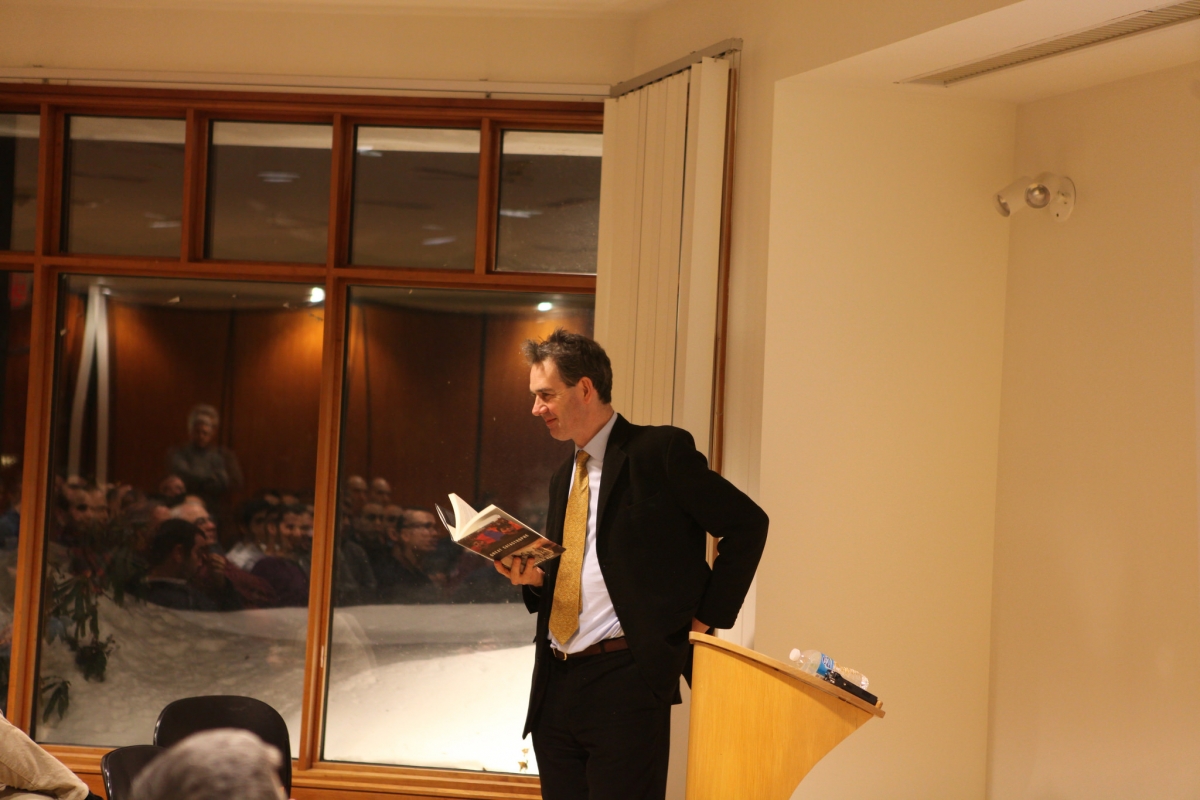
Click here to listen to the audio recording of this lecture.
Thursday, March 5th
Guest Lecturer: Masha Gessen
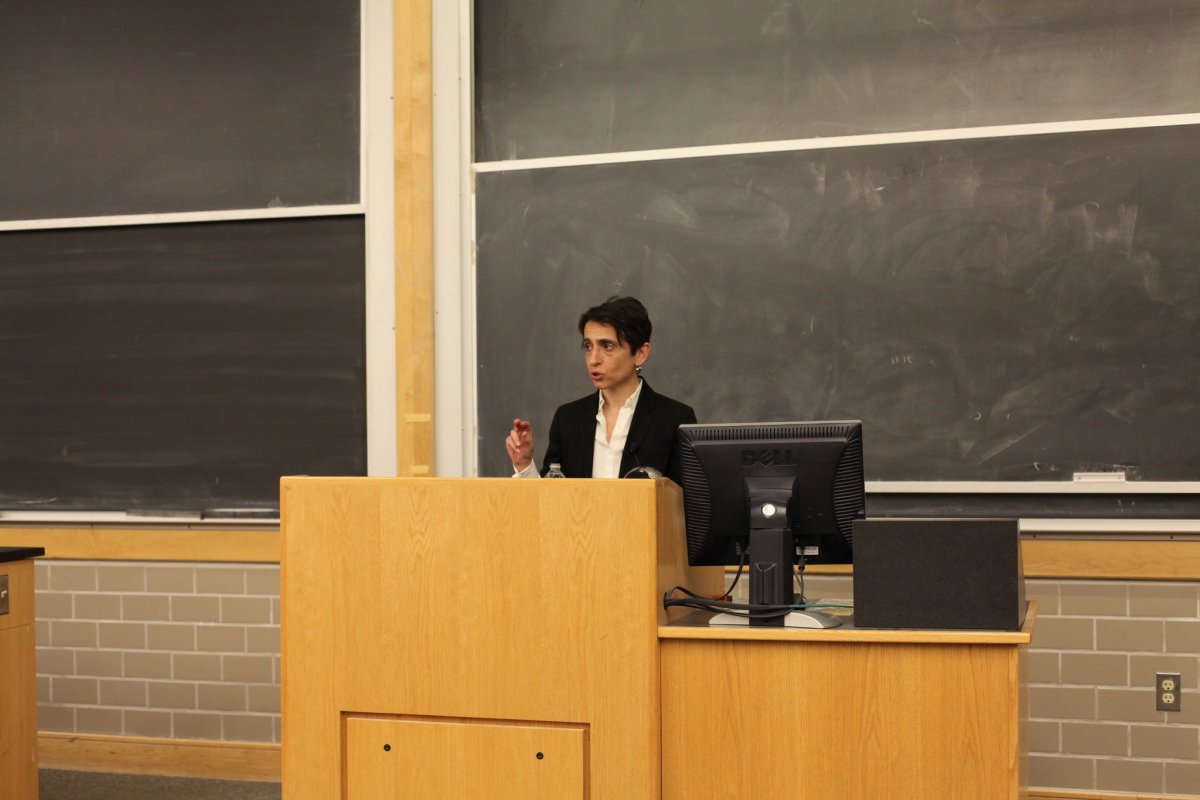
Click here to listen to the audio recording of this lecture.
Thursday, March 24th
Guest Lecturer: Ari Axelrod
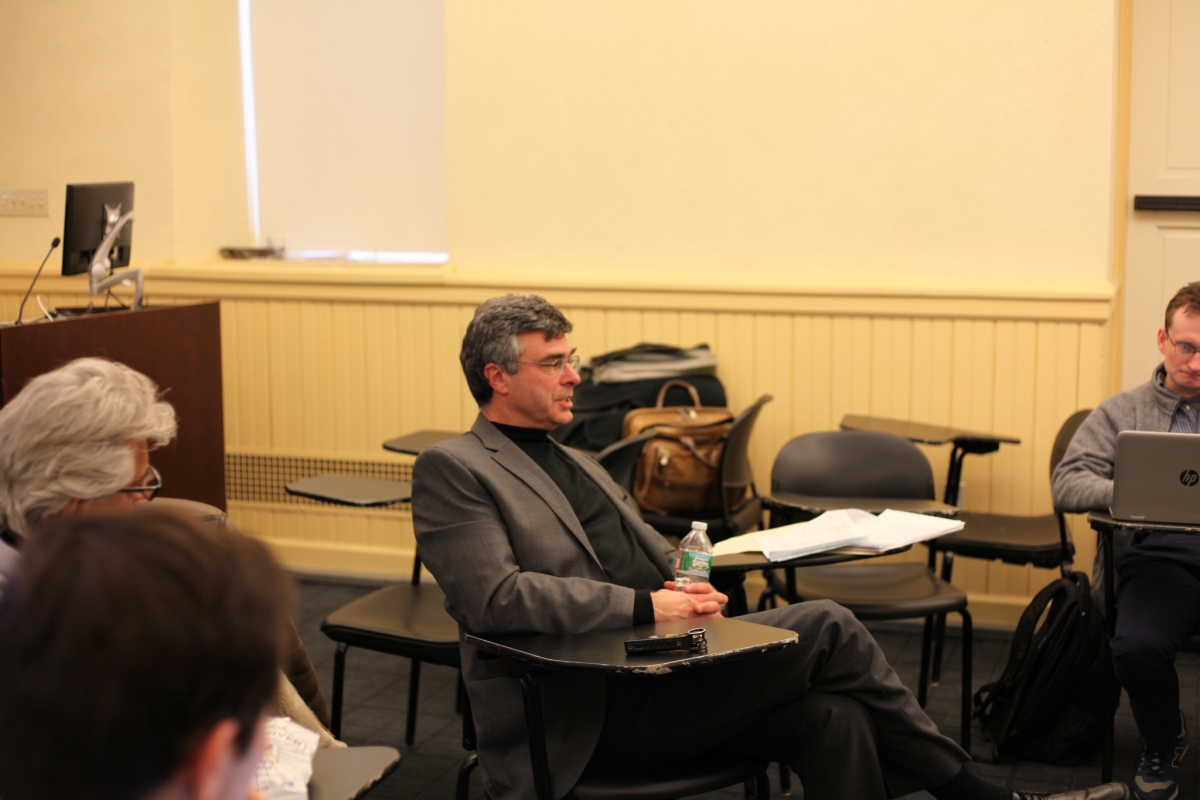
Axelrod is a Senior Fellow for Council on Emerging Market Enterprises at the Fletcher School of Law and Diplomacy.

